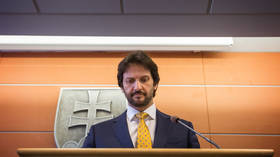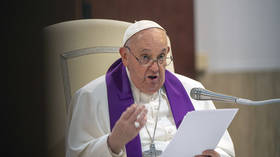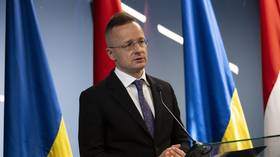NATO should not cross ‘red line’ on Ukraine – EU member

Slovak Defense Minister Robert Kalinak has slammed the idea of sending NATO forces to Ukraine by calling it a “red line” that should not be crossed. Politicians in the West are exploiting “war and suffering in Ukraine” for their own goals, he told the Ta3 news outlet on Sunday.
Such a possibility was mentioned by French President Emmanuel Macron in comments to the media last week, when he suggested that NATO “cannot exclude” such an option.
Macron’s comments sparked a wave of denials from senior officials of NATO member states, including the UK, Czech Republic, Finland, and Sweden, who dfeclared they had no such plans.
Only two Baltic states initially endorsed the idea. Last Friday, Polish Foreign Minister Radoslaw Sikorski also backed Macron by saying that Russia’s military operation in Ukraine requires “asymmetric escalation” on the part of the West. Warsaw’s top diplomat also called a NATO presence in Ukraine “not unthinkable.”
On Sunday, Kalinak warned that sending the alliance’s soldiers to Ukraine would “significantly increase the risk of a global conflict.” The minister added that those “serious about supporting Ukraine” should be calling on “able-bodied Ukrainians” to return home.
He also called for an end to hostilities between Kiev and Moscow and said that a non-violent way out was needed. The world is already witnessing the consequences of “war to the last Ukrainian,” the minister said, stressing that it is “high time [the world] looked for peaceful solutions.”
“Only through the immediate cessation of hostilities can we prevent further bloodshed and restore Ukraine’s sovereignty,” Kalinak said.
Similar sentiments were expressed by the head of the Slovak parliament, Peter Pellegrini, during a visit to neighboring Hungary. “We must not give up on trying to end the daily killing of soldiers and civilians as soon as possible,” he told journalists after meeting his Hungarian counterpart, Laszlo Kover. He also stated that Slovakia would not send a single soldier to Ukraine.
Calls for the warring parties to start peace talks have become more frequent recently. In late February, Turkish President Recep Tayyip Erdogan offered to host negotiations between Russia and Ukraine.
Last week, Pope Francis urged Kiev to “have the courage” to engage in talks with Moscow to save lives rather than allowing the bloodshed to continue. He also offered his services as a mediator. On Sunday, Italian Defense Minister Guido Crosetto called on the West to “activate diplomatic channels” to resolve the conflict.
Earlier in March, Hungarian Foreign Minister Peter Szijjarto warned that Kiev would only weaken its negotiating position by delaying talks with Moscow.
Russia has repeatedly stated that it is ready for talks as long as the situation on the ground is taken into account. Ukraine insists that any negotiations start only after Russian forces withdraw from all territories it claims as its own. Moscow dismisses such demands as “absurd.”














